Ditapis dengan
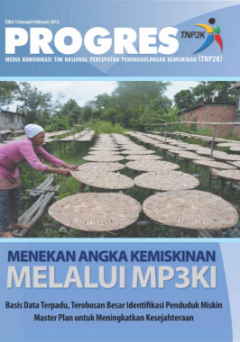
PROGRES TNP2K Media Komunikasi Tim Nasional Percepatan Penanggulangan Kemiskinan
Program Cash for Work telah membantu warga yang tertimpa musibah bencana erupsi Gunung Merapi. Program ini juga memulihkan semangat penduduk untuk kembali menata kehidupan mereka
- Edisi
- 1
- ISBN/ISSN
- -
- Deskripsi Fisik
- PDF, 29 Halaman
- Judul Seri
- Buletin
- No. Panggil
- 361.005 TNP p
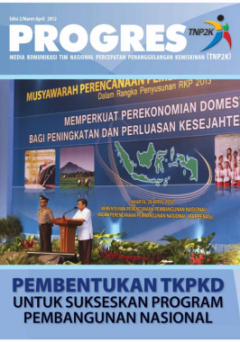
PROGRES TNP2K Media Komunikasi Tim Nasional Percepatan Penanggulangan Kemiski…
program cash for work telah membantu warga yang tertimpa musibah bencana erupsi gunung merapi. program ini juga memulihkan semangat penduduk untuk kembali menata kehidupan mereka
- Edisi
- 2
- ISBN/ISSN
- -
- Deskripsi Fisik
- PDF, 4 Halaman
- Judul Seri
- Buletin
- No. Panggil
- 361.005 TNP p
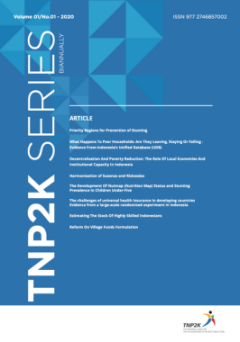
Jurnal TNP2K Series Vol.1 No.1 2020
One aspect of Indonesia’s health profile that still needs improvement is stunting. In 2018 Indonesia had one of the highest prevalence rates for stunting in the world at 30.8 percent. To achieve the National Medium- Term Development Plan 2015-2019 (Rencana Pembangunan Jangka Menengah Negara: RPJMN) target of a 28 percent stunting rate, in 2018 the government set priority areas for stunting pr…
- Edisi
- 1
- ISBN/ISSN
- 977 2746857002
- Deskripsi Fisik
- 255 Halaman, PDF
- Judul Seri
- Buletin
- No. Panggil
- 361.005 TNP j
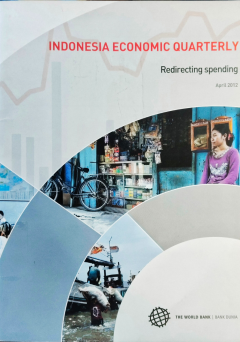
INDONESIA ECONOMIC QUARTERLY April 2012 ; Redirecting spending
International developments continue to shape Indonesia’s near-term economic outlook, but the focus of attention has shifted. In late 2011 the primary concern was the deteriorating and uncertain outlook for the global economy and financial markets. The recent sharp rise in global oil prices has added a new dimension to the situation, raising the projected cost of Indonesia’s fuel subsidies.
- Edisi
- April 2012
- ISBN/ISSN
- -
- Deskripsi Fisik
- xii, 52 halaman ; 28 cm
- Judul Seri
- Textbook
- No. Panggil
- 330.05 THE i
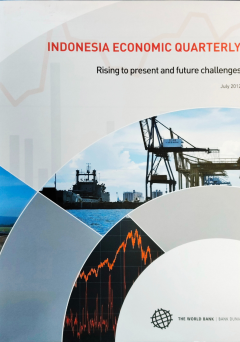
INDONESIA ECONOMIC QUARTERLY July 2012 ; Rising to present and future challe…
However, to date Indonesia’s growth performance has remained solid. GDP growth in the first quarter of 2012 was 6.3 percent year-on-year, down slightly from 6.5 percent in 2011 as a whole. Consumption held up well in the first quarter of 2012, investment growth came down while net exports made a negative contribution to growth.
- Edisi
- Juli 2012
- ISBN/ISSN
- -
- Deskripsi Fisik
- xi, 45 halaman ; 28 cm
- Judul Seri
- Textbook
- No. Panggil
- 330.05 THE i
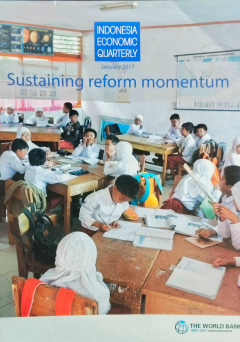
INDONESIA ECONOMIC QUARTERLY January 2017 ; Sustaining reform momentum
Indonesia was among the top 10 improvers globally in this year’s Doing Business report. Indonesia’s ranking improved from 106 in 2016 to 91 in 2017, thanks in particular to a record seven reforms that eased starting a business, getting electricity paying taxes, registering property, getting credit, enforcing contracts and trading across borders.
- Edisi
- Januari 2017
- ISBN/ISSN
- -
- Deskripsi Fisik
- iv, 40 halaman ; 28 cm
- Judul Seri
- Textbook
- No. Panggil
- 330.05 THE i
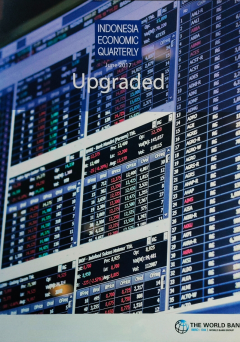
INDONESIA ECONOMIC QUARTERLY June 2017 ; Upgraded
Electricity price hikes in 2017 for 900 VA users have contributed to an increase in inflation to 3.9 percent for the first five months of the year. The effects of higher energy costs have been partially offset by lower food inflation. This year’s inflation is expected to average 4.3 percent, remaining within Bank Indonesia’s inflation target band.
- Edisi
- Juni 2017
- ISBN/ISSN
- -
- Deskripsi Fisik
- iv, 52 halaman ; 28 cm
- Judul Seri
- Textbook
- No. Panggil
- 330.05 THE i
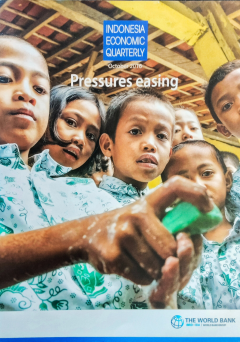
INDONESIA ECONOMIC QUARTERLY October 2016 ; Pressures easing
Tourism is a promising sector to boost the country’s growth. Growth in this sector could help unlock private investment, create jobs, boost exports and guide infrastructure investments. According to the World Travel and Tourism Council, every $1 million in travel and tourism spending supports around 200 jobs and $1.7 million in GDP for Indonesia.
- Edisi
- Oktober 2016
- ISBN/ISSN
- -
- Deskripsi Fisik
- v, 59 halaman ; 28 cm
- Judul Seri
- Textbook
- No. Panggil
- 330.05 THE i
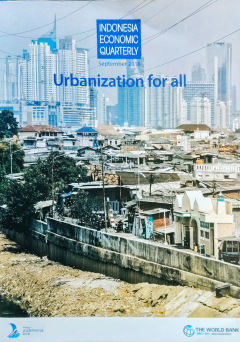
INDONESIA ECONOMIC QUARTERLY September 2018 ; Urbanization for all
Indonesia’s real GDP growth rose to 5.3 percent as domestic demand strengthened. Private and government consumption accelerated thanks to higher subsidy and personnel spending, as well as a pick-up in credit growth, stable inflation and strong job markets.
- Edisi
- September 2018
- ISBN/ISSN
- -
- Deskripsi Fisik
- v, 68 halaman ; 28 cm
- Judul Seri
- Textbook
- No. Panggil
- 330.05 THE i
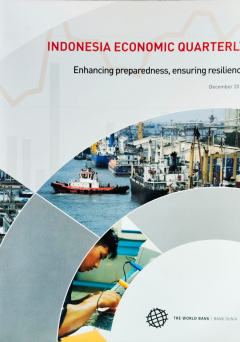
INDONESIA ECONOMIC QUARTERLY December 2011 ; Enhancing preparedness ensuring …
International financial markets remain turbulent, but Indonesia's economy is relatively well-positioned to weather future external shocks and steps have been taken to improve crisis preparedness such as increasing the flexibility of any fiscal response and the creation of a government bond stabilization framework.
- Edisi
- Desember 2011
- ISBN/ISSN
- -
- Deskripsi Fisik
- x, 46 halaman ; 28 cm
- Judul Seri
- Textbook
- No. Panggil
- 330.05 THE i
 Karya Umum
Karya Umum  Filsafat
Filsafat  Agama
Agama  Ilmu-ilmu Sosial
Ilmu-ilmu Sosial  Bahasa
Bahasa  Ilmu-ilmu Murni
Ilmu-ilmu Murni  Ilmu-ilmu Terapan
Ilmu-ilmu Terapan  Kesenian, Hiburan, dan Olahraga
Kesenian, Hiburan, dan Olahraga  Kesusastraan
Kesusastraan  Geografi dan Sejarah
Geografi dan Sejarah